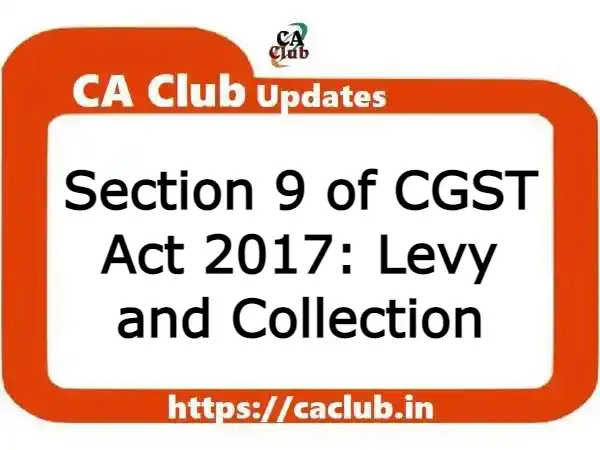Provisions under Section 9 of the Central Goods and Services Tax (CGST) Act, 2017 relating to “Levy and Collection”:
Section 9 of CGST Act 2017: Levy and Collection (CHAPTER III LEVY AND COLLECTION OF TAX)
(1) Subject to the provisions of sub-section (2), there shall be levied a tax called the central goods and services tax on all intra-State supplies of goods or services or both, except on the supply of alcoholic liquor for human consumption, on the value determined under section 15 and at such rates, not exceeding twenty per cent, as may be notified by the Government on the recommendations of the Council and collected in such manner as may be prescribed and shall be paid by the taxable person.
(2) The central tax on the supply of petroleum crude, high speed diesel, motor spirit (commonly known as petrol), natural gas and aviation turbine fuel shall be levied with effect from such date as may be notified by the Government on the recommendations of the Council.
(3) The Government may, on the recommendations of the Council, by notification, specify categories of supply of goods or services or both, the tax on which shall be paid on reverse charge basis by the recipient of such goods or services or both and all the provisions of this Act shall apply to such recipient as if he is the person liable for paying the tax in relation to the supply of such goods or services or both.
(4) The central tax in respect of the supply of taxable goods or services or both by a supplier, who is not registered, to a registered person shall be paid by such person on reverse charge basis as the recipient and all the provisions of this Act shall apply to such recipient as if he is the person liable for paying the tax in relation to the supply of such goods or services or both. The Government may, on the recommendations of the Council, by notification, specify a class of registered persons who shall, in respect of supply of specified categories of goods or services or both received from an unregistered supplier, pay the tax on reverse charge basis as the recipient of such supply of goods or services or both, and all the provisions of this Act shall apply to such recipient as if he is the person liable for paying the tax in relation to such supply of goods or services or both. [sub-section (4) substituted from 01/02/2019: refer Note 1]
(5) The Government may, on the recommendations of the Council, by notification, specify categories of services the tax on intra-State supplies of which shall be paid by the electronic commerce operator if such services are supplied through it, and all the provisions of this Act shall apply to such electronic commerce operator as if he is the supplier liable for paying the tax in relation to the supply of such services:
Provided that where an electronic commerce operator does not have a physical presence in the taxable territory, any person representing such electronic commerce operator for any purpose in the taxable territory shall be liable to pay tax:
Provided further that where an electronic commerce operator does not have a physical presence in the taxable territory and also he does not have a representative in the said territory, such electronic commerce operator shall appoint a person in the taxable territory for the purpose of paying tax and such person shall be liable to pay tax.
| Note: CBEC notifies 01/07/2017 as the commencement date vide Notification 9/2017. |
Amendments History:
1. Sub-section (4) substituted, vide Section 4 of the CGST (Amendment) Act, 2018, followed with Notification 2/2019 on commencement date of 01/02/2019.
—-
| CGST Act 2017: Last updated 15/02/2024 |
| The CGST Act 2017 has been notified vide GOI Notification dated 12/04/2017, which has subsequently been amended through the CGST (Extension to J&K) Act 2017, Finance Act 2018, CGST Amendment Act 2018, Finance Act 2019, Finance Act 2020, Taxation and Other Laws (Relaxation of Certain Provisions) Ordinance/Act 2020, Finance Act 2021, Finance Act 2022, Finance Act 2023, CGST Amendment Act 2023, CGST Second Amendment Act 2023 & Finance Act, 2024 including various Notifications/Orders issued by the Govt./ CBIC from time to time, relating to the commencement dates of various sections and provisions in the respective CGST/Amendment Acts, wherever required. Information on this page is a section-wise compilation of the amendments to the CGST Act, 2017 made through various notifications issued by CBIC from time to time (upto 15th February, 2024), with the best possible efforts for accuracy. In any case, E&OE. For official or updated information, please visit the CBIC website. |
| Latest Updates from CBIC |
| For index of GST Circulars, Notifications, Press Releases, Orders, etc. issued by CBIC from 2017 and onwards along with Section-wise/Rule-wise Text of GST Acts/Rules: GST Updates |
